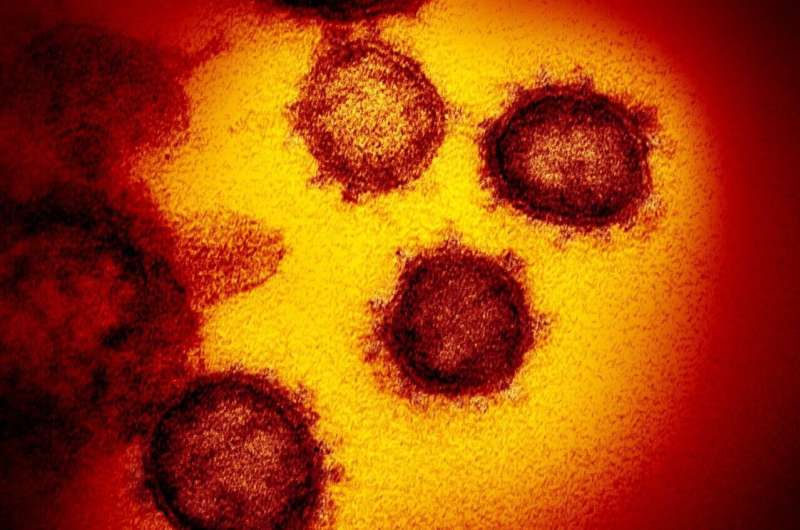Transmission electron microscope image of SARS-CoV-2, the virus that causes COVID-19, emerging from human cells. Credit: NIAID
A new paper in Brain, published by Oxford University Press, indicates that a COVID-19 infection may prompt Guillain-Barré syndrome.
Since early 2020, the COVID-19 pandemic has affected the entire world, either by direct infection or through its social and economic consequences. Besides the well-known severe respiratory signs, and the risk of long-term complications, researchers and public health officials have also reported both central and peripheral neurological complications.
Guillain-Barré syndrome is an autoimmune disorder in which a person's immune system attacks the nerves, causing muscle weakness and occasionally paralysis. The disease can last for weeks or several years. The disease is relatively rare (In the United States 3,000-6,000 people develop the condition every year) but can be severe.
The condition is triggered by an acute bacterial or viral infection. Since the beginning of the pandemic, doctors have reported over 90 Guillain-Barré diagnoses following a possible COVID-19 infection. However, whether COVID-19 is another potential infectious trigger or whether the reported cases are coincidental is unclear.
Using an international collection of Guillain-Barré syndrome patients known as the International GBS Outcome Study (or IGOS), researchers studied patients from January 30th until May 30th 2020. Some 49 Guillain-Barré syndrome patients were added to the study during this period from China, Denmark, France, Greece, Italy, the Netherlands, Spain, Switzerland, and the United Kingdom.
In this cohort study, 22% of the Guillain-Barré syndrome patients included during the first 4 months of the pandemic had a preceding COVID-19 infection. These patients were all over 50 years of age and patients frequently (65%) experienced facial palsy (64%) and had a demyelination form of GBS. At hospital admission, 73% of the Guillain-Barré patients with a COVID-19 infection had increased inflammatory markers. All these patients fulfilled the diagnostic criteria for both Guillain-Barré syndrome and COVID-19.
Researchers here emphasized, however, that they did not find more patients diagnosed with Guillain-Barré syndrome during the first four months of the pandemic compared to previous years. This suggests that while a strong association between a COVID-19 infection and Guillain-Barré syndrome is not likely, a COVID-19 infection may sometimes lead patients to develop Guillain-Barré syndrome.
"Our study shows that COVID-19 may precede Guillain-Barré syndrome in rare cases, said Bart C. Jacobs, one of the paper's authors, "but the existence of a true association or causal relation still needs to be established".
More information: Linda W G Luijten et al, Guillain-Barré syndrome after SARS-CoV-2 infection in an international prospective cohort study, Brain (2021). DOI: 10.1093/brain/awab279
Journal information: Brain
Provided by Oxford University Press
























